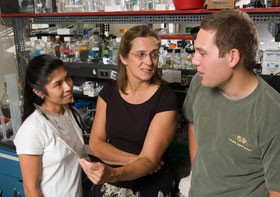  |
| HOME | THIS ISSUE | CALENDAR | GRANTS | BACK ISSUES | < BACK | NEXT > |
Health Center microbiologist passionate about science, mentoring
by Pat Keefe - December 5, 2005 |
||||
|
Sandra Weller has two professional passions: science and mentoring. As chair of the Health Center’s Department of Molecular, Microbial and Structural Biology, she is perfectly positioned to pursue both. One of the nation’s leading scientists in viral DNA replication, Weller is conducting research on the herpes simplex virus Type 1. Her lab explores the process by which a virus’s nucleic acid is enclosed in a virus particle. “We use biochemical, genetic, and cell-biological approaches to study various aspects of the viral life cycle,” she says. “Several of the proteins we study are considered targets for anti-viral therapy. We hope to develop novel approaches using those targets to treat viral infections.” Weller also enjoys interacting with other scientists. “I really enjoy opportunities to mentor,” she says, “and I’m passionate about working with students, post-doctoral fellows, and junior faculty. “This job gives me a great opportunity to mentor at all levels, and in some ways to be a scientific matchmaker,” she adds. “Someone walks in who needs to know something, or someone wants to try a new approach, and I enjoy putting them together with the person they’re looking for, or someone who can help. I enjoy facilitating scientific interactions.” Weller, a Pasadena, Calif. native, Stanford undergraduate, and University of Wisconsin doctoral recipient, has been interested in research since the eighth grade. An interview published when she was in high school revealed her intention to become a “research biochemist.” Classmates at her 35th high school reunion commented on the fact she was one of only a handful to accomplish what she set out to do – and actually like it. Her graduate experience at Wisconsin confirmed her love of science and research, and also introduced her to the finer points of mentoring. Her mentor was Howard Temin, co-recipient of the 1975 Nobel Prize in medicine. “He was an inspiring mentor himself,” she says. “He cared about his grad students. It was an intellectually stimulating environment, and it was my first opportunity to take charge of projects and learn to be a good scientist and a good teacher.” Weller came to the Health Center in 1984, fresh from a post-doc at Harvard Medical School. She was recruited by Mary Jane Osborn, a member of the National Academy of Science and the Health Center’s legendary head of microbiology. “I was extremely impressed with the Health Center,” Weller says.“I was struck by the quality of the science being conducted here, not only in the Department of Microbiology, but also in biochemistry and the rest of the Health Center, too. Microbiology was a vibrant, research-oriented department where the faculty members were leaders in the field, but they were very approachable, friendly, collaborative and collegial.”
The microbiology and biochemistry departments merged in 2003 to form a new Department of Molecular, Microbial, and Structural Biology that exposed her to something else, too: leadership. Weller was named the first chair of the new department. She was chosen to participate in the Executive Leadership in Academic Medicine program at Drexel University College of Medicine in Philadelphia. Part of the Institute for Women’s Health and Leadership at Drexel, it prepares female faculty at U.S. and Canadian medical and dental schools for senior leadership positions at academic health centers. Weller is one of four faculty members at the Health Center to take part in the program. Weller has received widespread recognition for her scientific work. In 2000, she was elected to the Connecticut Academy of Science and Engineering, and in 2001, she was elected a fellow in the American Academy of Microbiology. She is also an NIH MERIT awardee, a designation given to the best researchers nationally. These highly selective awards provide long-term support to “investigators with impressive records of scientific achievement in research areas of special importance or promise.” Less than 5 percent of NIH-funded investigators are selected to receive MERIT awards. Weller recently learned that her third concurrent NIH grant is likely to be funded. “She is a scientist of the highest caliber. She’s considered at the top of her field,” says Debra Kendall, Board of Trustees Distinguished Professor in Molecular and Cell Biology, who has worked with Weller on the structural biology partnership between the Health Center and the Storrs campus. “Sandy also has a history of working well with colleagues. She’s able to look beyond the politics and get to the science and bring people together.” Weller says she loves her work. “We have a terrific team of students, post-doctoral fellows, and technicians who also love what they do,” she say. “It’s inspiring to work with them. In some ways, my lab is doing the best science we’ve ever done, and in the last couple of years some wonderful discoveries are taking us in new directions in herpes virus research and virus-host interactions. I feel we’re making an important contribution to the field.” |
| ADVANCE HOME UCONN HOME |

